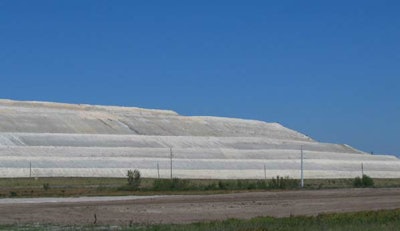
A new law in Florida directs the state Department of Transportation to conduct demonstration projects using phosphogypsum – properties of which decay to a radioactive gas – as an aggregate in roadbuilding.
The controversial bill was signed June 29 by Gov. Ron DeSantis over objections by environmental groups that say the substance contains radioactive material that will harm groundwater and air quality. The U.S. Environmental Protection Agency has banned the use of phosphogypsum as an aggregate material in road construction and other uses since 1992. However, with radium-226 levels below a certain threshold, it can be used by farmers, according to the EPA.
The law is part of the state’s effort to recycle phosphogypsum, which is a byproduct left over from the production of phosphoric acid, an ingredient in fertilizer. Florida contains the world’s largest production of phosphate and has the most phosphogypsum stacks in the country. The stacks range from 5 to 800 acres and are 10 to 200 feet high. It is estimated 5.2 tons of phosphogypsum are created from making 1 ton of phosphoric acid.
Phosphogypsum contains uranium and thorium that decay to radium, and radium decays to radon. Radon, an odorless, colorless radioactive gas, emits from the stacks, the EPA says. It is also found in the natural decay of uranium and radium and is found in nearly all rocks and soils.
For use in agriculture, the EPA says, phosphogypsum cannot have a radium-226 concentration greater than 10 pCi/g.
Most of North Florida’s phosphogypsum stacks are below the EPA’s restricted level for agricultural use, according to the Florida Industrial and Phosphate Research Institute. However, phosphogypsum from Central Florida is above that level.
There is debate as to whether phosphogypsum is safe as a road aggregate.
The Center for Biological Diversity opposed the Florida legislation saying it would expose the public, especially road construction workers, to cancer risk and could also contaminate surface and ground waters through leaching of trace metals and radionuclides. It is estimated Florida has 1 billion tons of phosphogypsum in 24 stacks.
“This would be an outrageous handout to the phosphate industry at the expense of the health and safety of Floridians and our environment,” said Ragan Whitlock, an attorney at the Center for Biological Diversity, in February when the bill was being considered. “If this bill becomes law, Florida roads would become ticking time bombs, waiting for the next storm event to expose our communities and waterways to this radioactive waste.”
The nonprofit group notes that in 2020 the EPA under President Trump approved the use of phosphogypsum in roads but that was withdrawn a year later following a lawsuit. The group says allowing the use of phosphogypsum as aggregate would let the phosphorous industry off the hook for properly disposing of the waste.
The Fertilizer Institute, however, argues that the use of phosphogypsum in road construction is safe and is used in other parts of the world. In response to the EPA withdrawing its approval of the substance in road construction in 2021, the institute cited the International Atomic Energy Agency, which it said concluded that, “[a]ll evidence suggests that the [radiation] doses received as a result of the use of phosphogypsum in agriculture, road construction, in the marine environment, and in landfill facilities are sufficiently low that no restrictions on such use are necessary.”
It added that the EPA’s withdrawal of the approval was based on procedural grounds and leaves open possibility “for site specific projects to be considered for EPA approval.” Citing the agency’s prior approval, the institute says, “We concur with EPA’s scientific evaluation and conclusion that the risk associated with the use of PG in road construction is no greater than stacking the material or placing it in mines.”
In 2020, the EPA gave conditional approval to the Fertilizer Institute’s request to use phosphogypsum in government road construction, citing a study by the institute that said “the proposed use of phosphogypsum in road construction is as protective of public health, in both the short- and long-term, as is disposal of phosphogypsum in a stack.”
However, in its later withdrawal of that approval in 2021, the EPA said, “The Fertilizer Institute’s request did not provide all the information required for a complete request under these regulations.”
According to the new Florida law, the state Department of Transportation has until April 1, 2024, to study and determine the suitability of phosphogypsum as road construction aggregate. If the FDOT determines it to be suitable, the law says phosphogypsum “may be used as a construction aggregate material in accordance with the conditions of the United States Environmental Protection Agency approval for the use.” The law took effect July 1.











